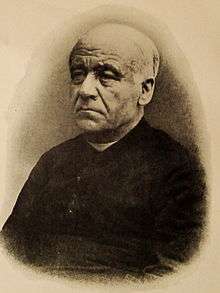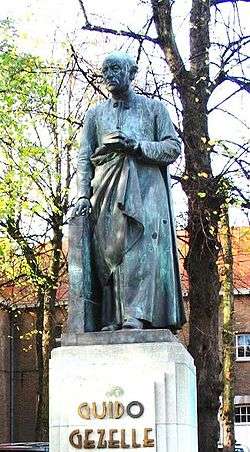Guido Gezelle
Guido Pieter Theodorus Josephus Gezelle (1 May 1830 – 27 November 1899) was an influential writer and poet and a Roman Catholic priest from Belgium. He is famous for the use of the West Flemish dialect.
Guido Gezelle | |
|---|---|
 Guido Gezelle | |
| Born | 1 May 1830 |
| Died | 27 November 1899 (aged 69) Bruges, Belgium |
| Nationality | Belgium |
| Occupation | Poet, priest, writer |

Life
He was born in Bruges in the province of West Flanders, where he also spent most of his life. He was ordained a priest in 1854, and worked as a teacher and priest in Roeselare. He was always interested in all things in English and was given the prestigious right of being the priest for the 'English Convent' in Bruges. He died there in a small room, where it is still forbidden to enter.
He was the son of Monica Devrieze and Pieter Jan Gezelle, a Flemish gardener in Bruges. Gezelle was the uncle of Flemish writer Stijn Streuvels (Frank Lateur).
There is a museum of his works close by the English convent and also a small bar named after him.
He tried to develop an independent Flemish language, more or less separated from the general Dutch language, which had certain more "Hollandic" aspects. The Dutch he used in his poems was heavily influenced by the local West Flemish dialect. His works are often inspired by his mystic love towards God and Creation. Later, his poetry was associated with literary Impressionism, and he is considered a forerunner of that movement.
Gezelle also was a translator of poetry and prose, most famous now for his translation of Henry Wadsworth Longfellow's Song of Hiawatha, published in 1886. He had already read the original at Roeselare in 1856 and was interested in it because on the one hand, the American Indians fascinated him, and, on the other, he liked its portrayal of Christian missionaries.
For his linguistical mastery, Gezelle is considered one of the most important poets of Dutch literature.
Bibliography
- Kerkhofblommen (1858)
- Vlaemsche Dichtoefeningen (1858)
- Kleengedichtjes (1860)
- Gedichten, Gezangen en Gebeden (1862)
- Longfellows Song of Hiawatha (translation, 1886)
- Tijdkrans (1893)
- Rijmsnoer (1897)
- Laatste Verzen (1901)
See also
References
External links
- Guido Gezelle archives by Bruges Public Library (in English, includes poems in translation)


- Works by Guido Gezelle at Project Gutenberg
- Works by or about Guido Gezelle at Internet Archive
- Works by Guido Gezelle at LibriVox (public domain audiobooks)
